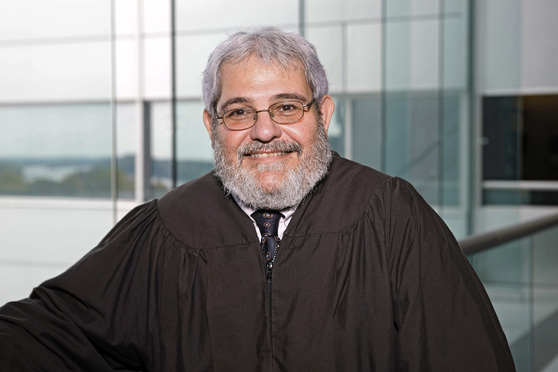Appellate Division Upholds PERC's Authority in Security Camera, Teacher Discipline Cases
The three-judge panel in a published decision said PERC has "exclusive jurisdiction to decide complaints arising under the New Jersey Employer-Employee Relations Act."
July 16, 2018 at 04:02 PM
4 minute read
 Appellate Division Judge Jose Fuentes
Appellate Division Judge Jose Fuentes
A New Jersey appeals court ruled that the state's Public Employment Relations Commission has near-exclusive jurisdiction over labor disputes between public workers and their employers.
The three-judge panel in a published decision Monday said PERC has “exclusive jurisdiction to decide complaints arising under the New Jersey Employer-Employee Relations Act.”
“We further hold that the Law Division does not have jurisdiction to enforce an order entered by PERC,” said Appellate Division Judge Jose Fuentes for the panel, joined by Judges Ellen Koblitz and Karen Suter.
The court also upheld a teachers' union's right “to engage in good faith negotiations to ascertain the impact the installation of exposed cameras with both audio and video capabilities would have on the terms and conditions of employment for the employees.”
The appeals court ruling resolves two disputes between the Belleville Education Association, which represents the unionized school district employees in the township, and the Belleville Board of Education.
The first dispute involved the board's decision, which dates back to January 2014, to issue radio frequency identification (RFID) cards to every school employee, and to install video cameras, with audio capability, in virtually all areas of the district schools, though no cameras were installed in restrooms, locker rooms or in the nurses' offices. The board said both measures were to improve security.
The BEA complained about the installations of the cameras, saying it would improperly interfere with its members' ability to discuss union matters.
PERC held that the installation of the cameras was a condition that should have been negotiated between the board and the union. The board appealed in 2015, though arguments were not heard by the Appellate Division until September 2017, by which time, the board already had decided to remove all cameras from its schools or at least have them remain inoperative, the decision notes.
Still, the Appellate Division ruled on the issue, and affirmed.
“In our view, PERC's thoughtful decision properly applied the [In re Local 195 IFPTE, 88 N.J. 393 (1982)] test to strike a proper balance between the Board's managerial prerogative and obligation to ensure the safety of students and staff, and the BEA's right to advocate and negotiate for the interests of its members,” Fuentes wrote. “The issues PERC addressed include, but are not limited to, good faith negotiations concerning the designation of zones of privacy where cameras would not be installed.”
In at least one aspect, the appeals court agreed with the board's reasoning.
“The district has a prerogative, and a responsibility, to take the measures it deems appropriate to protect the safety of its students and staff, particularly in light of the numerous instances of public violence in our schools nationwide in recent past,” Fuentes said.
The second issue, according to the court, involved a disciplinary matter against the union's president, Michael Mignone, whom the board suspended for three months without pay after he allegedly allowed a teacher to listen in on a phone conversation with a parent involving a student. PERC took up the matter and reduced the penalty to 30 days.
Mignone sought relief in Essex County Superior Court, but a trial judge dismissed his action, saying PERC had the authority to decide these work-related matters.
The appeals court agreed.
“[PERC] has the exclusive authority to enforce its own orders and decisions,” Feuntes said, adding that the Law Division “does not have jurisdiction to enforce an order entered by PERC under the summary enforcement proceedings available in Rule 4:67-6.”
The union's attorney, Sanford Oxfeld of Oxfeld Cohen in Newark, said he agreed “with 95 percent of the ruling,” but said he believed the appeals court should have upheld Mignone's right to seek relief in the Law Division.
As for the security cameras, Oxfeld said the district had spent $2 million on the camera system, and then realized it couldn't afford to maintain it. “It was a boondoggle,” he said.
The board's attorney, Stephen Edelstein of Whippany's Schwartz Edelstein, did not return calls seeking comment.
This content has been archived. It is available through our partners, LexisNexis® and Bloomberg Law.
To view this content, please continue to their sites.
Not a Lexis Subscriber?
Subscribe Now
Not a Bloomberg Law Subscriber?
Subscribe Now
NOT FOR REPRINT
© 2025 ALM Global, LLC, All Rights Reserved. Request academic re-use from www.copyright.com. All other uses, submit a request to [email protected]. For more information visit Asset & Logo Licensing.
You Might Like
View All
On the Move and After Hours: Meyner and Landis; Cooper Levenson; Ogletree Deakins; Saiber
3 minute read
AstraZeneca Files Flurry of Lawsuits to Protect Cancer Treatment Drug
3 minute read
In 2-1 Ruling, Court Clears Way for Decade-Old Wrongful Imprisonment Suit
5 minute read
Appellate Division Rejects Third Circuit Interpretation of NJ Law, Says No Arbitration for Insurance Fraud
4 minute readTrending Stories
- 1'It's Not Going to Be Pretty': PayPal, Capital One Face Novel Class Actions Over 'Poaching' Commissions Owed Influencers
- 211th Circuit Rejects Trump's Emergency Request as DOJ Prepares to Release Special Counsel's Final Report
- 3Supreme Court Takes Up Challenge to ACA Task Force
- 4'Tragedy of Unspeakable Proportions:' Could Edison, DWP, Face Lawsuits Over LA Wildfires?
- 5Meta Pulls Plug on DEI Programs
Who Got The Work
Michael G. Bongiorno, Andrew Scott Dulberg and Elizabeth E. Driscoll from Wilmer Cutler Pickering Hale and Dorr have stepped in to represent Symbotic Inc., an A.I.-enabled technology platform that focuses on increasing supply chain efficiency, and other defendants in a pending shareholder derivative lawsuit. The case, filed Oct. 2 in Massachusetts District Court by the Brown Law Firm on behalf of Stephen Austen, accuses certain officers and directors of misleading investors in regard to Symbotic's potential for margin growth by failing to disclose that the company was not equipped to timely deploy its systems or manage expenses through project delays. The case, assigned to U.S. District Judge Nathaniel M. Gorton, is 1:24-cv-12522, Austen v. Cohen et al.
Who Got The Work
Edmund Polubinski and Marie Killmond of Davis Polk & Wardwell have entered appearances for data platform software development company MongoDB and other defendants in a pending shareholder derivative lawsuit. The action, filed Oct. 7 in New York Southern District Court by the Brown Law Firm, accuses the company's directors and/or officers of falsely expressing confidence in the company’s restructuring of its sales incentive plan and downplaying the severity of decreases in its upfront commitments. The case is 1:24-cv-07594, Roy v. Ittycheria et al.
Who Got The Work
Amy O. Bruchs and Kurt F. Ellison of Michael Best & Friedrich have entered appearances for Epic Systems Corp. in a pending employment discrimination lawsuit. The suit was filed Sept. 7 in Wisconsin Western District Court by Levine Eisberner LLC and Siri & Glimstad on behalf of a project manager who claims that he was wrongfully terminated after applying for a religious exemption to the defendant's COVID-19 vaccine mandate. The case, assigned to U.S. Magistrate Judge Anita Marie Boor, is 3:24-cv-00630, Secker, Nathan v. Epic Systems Corporation.
Who Got The Work
David X. Sullivan, Thomas J. Finn and Gregory A. Hall from McCarter & English have entered appearances for Sunrun Installation Services in a pending civil rights lawsuit. The complaint was filed Sept. 4 in Connecticut District Court by attorney Robert M. Berke on behalf of former employee George Edward Steins, who was arrested and charged with employing an unregistered home improvement salesperson. The complaint alleges that had Sunrun informed the Connecticut Department of Consumer Protection that the plaintiff's employment had ended in 2017 and that he no longer held Sunrun's home improvement contractor license, he would not have been hit with charges, which were dismissed in May 2024. The case, assigned to U.S. District Judge Jeffrey A. Meyer, is 3:24-cv-01423, Steins v. Sunrun, Inc. et al.
Who Got The Work
Greenberg Traurig shareholder Joshua L. Raskin has entered an appearance for boohoo.com UK Ltd. in a pending patent infringement lawsuit. The suit, filed Sept. 3 in Texas Eastern District Court by Rozier Hardt McDonough on behalf of Alto Dynamics, asserts five patents related to an online shopping platform. The case, assigned to U.S. District Judge Rodney Gilstrap, is 2:24-cv-00719, Alto Dynamics, LLC v. boohoo.com UK Limited.
Featured Firms
Law Offices of Gary Martin Hays & Associates, P.C.
(470) 294-1674
Law Offices of Mark E. Salomone
(857) 444-6468
Smith & Hassler
(713) 739-1250






